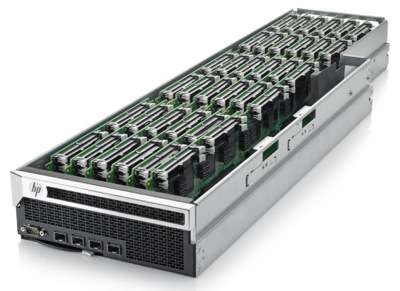HP Announces Next Low Energy Atom Server - Codenamed Gemini

HP has announced today that they are going towards a more energy efficient approach with their Project Moonshot, which is simply a program HP is running to develop better, low-engery technologies. Keep in mind, this is HPs second time doing something like this. They released a low-energy ARM server a while back, and are now redoing it one more time, but this time, based on the Intel Atom.
Essentially, this new server, that HP is calling Gemini, is based on a very small footprint, to enable having a whole bunch of these in a datacenter, taking very little power compared to their standard ProLiants.
It might be cool, but these servers might cost a bit more than one will think as now the electronics are being crammed inside a tiny area. And if you know what a normal server looks like, it will be interesting to see how easy these are to work on if something breaks. And remember, this is being powered by the Intel Atom! That's no server-oriented processor at all; you wouldn't even be able to run a VM on their quickly.
HP is taking the right next step, but I'm not sure if this will be used in the real-world all too much. What do you think? Is this truly the next step for an energy efficient server?
The full press release is below or view it in the source down below!
HP Unveils Next Phase in Project Moonshot Extreme Low-energy Server Initiative HP selects Intel Atom processor codename "Centerton" for initial production server system PALO ALTO, Calif., June 19, 2012 HP today announced that for the next phase of Project Moonshot, the company's initiative to develop extreme low-energy servers, it has chosen to lead with server cartridges featuring the Intel® Atom® processor codenamed "Centerton" for its initial production system. Project Moonshot, a multiyear program unveiled last November, is designed to help customers significantly reduce server complexity, energy use and costs. Pioneering the future of low-energy computing for emerging web, cloud and massive-scale environments, the program reinvents the traditional approach to hyperscale computing. It leverages workload-optimized, extreme low-energy "server cartridges" in a unique enclosure that pools resources across thousands of servers. HP chose to lead with Centerton server cartridges in its initial production server system, codenamed Gemini, due to the processor's data-center-class features, such as 64-bit support, hardware virtualization (VTx), error correcting code (ECC) memory, lower power requirements, increased performance and broad software ecosystem. These features, coupled with the revolutionary Gemini infrastructure, make the new Centerton-based servers ideal for hyperscale workloads, where using many extreme low-energy servers densely packed into a small footprint can be much more efficient than fewer standalone servers. Gemini innovations transform the server industry Gemini will introduce several innovations primarily centered on its unique federated environment that is processor-neutral. Traditional servers rely on dedicated components, including management, networking, storage, power cords and cooling fans in a single enclosure. However, Gemini enclosures are capable of supporting thousands of servers per rack that share these components. This enables customers to pack a lot more compute power into a smaller footprint, while significantly driving down complexity, energy use and costs. The newly designed Gemini server system with Centerton server cartridges provides an ideal solution for web serving, offline analytics and hosting. The system is expected to realize similar power, cost and density benefits of the previously announced Redstone development platform. "Customers leveraging hyperscale computing are looking to realize radical space, cost and energy savings, and with Project Moonshot we've introduced the breakthrough approach needed to achieve these savings," said Paul Santeler, vice president and general manager, Hyperscale Business Unit, Industry-standard Servers and Software, HP. "Together with Intel's enhanced processor features and collaboration, we're able to transform the server industry by enabling customers to exceed the limits of what was previously possible in hyperscale computing." HP and Intel have a longstanding relationship in driving innovation. To further address customer requirements and range of workloads, the two industry leaders are collaborating on additional extreme low-energy Gemini server cartridges based on future generations of the Intel Atom micro architecture. "For the last 3 years Intel has shown its commitment to constant innovation in the extreme low-energy server initiative, and our deep collaboration with HP enabled us to create a processor roadmap designed to deliver exceptional performance and power-efficiency benefits," said Jason Waxman, general manager, Cloud Infrastructure at Intel Data Center and Connected Systems Group, Intel Corporation. "The unprecedented value of the Intel Atom processor codenamed Centerton-with features like 64-bit support, ECC and an established software x86 ecosystem-will offer customers the increased flexibility and drastically reduced total cost of ownership required to compete in the fast-growing hyperscale computing space." HP has a robust development roadmap of Gemini server cartridges incorporating processors from other vendors for use within the Gemini system. These cartridges will incorporate features needed for an extended set of workloads and will offer a wide range of density and performance configurations. Availability The Gemini server system incorporating Centerton-based compute cartridges, which was demonstrated today at a press event in San Francisco, is in use in HP's Discovery lab in Houston and will soon be available for customer testing. It is expected to begin shipping in early production to customers by year's end.
Stalk me on social media! Any other way would just be creepy…
Follow me: